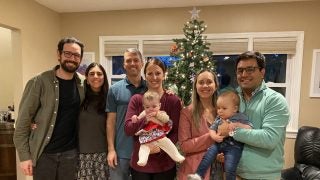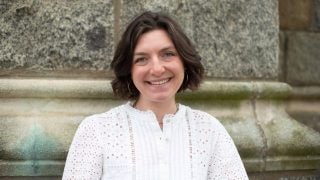Before coming to Georgetown, Emily Hardy (SFS’23) had never traveled extensively, let alone by herself.
Now as she prepares to walk the stage at commencement, Hardy can say she’s quite literally traveled around the world — all in 90 days.

Hardy is part of an elite group of circumnavigators. The rules Hardy had to follow were not for the faint of heart: She had to travel in one direction to at least six countries and three continents. Her travels had to exceed the distance of the Earth’s equator — all 24,900 miles. And she had to do it all in just three months.
For Hardy, that was a challenge waiting to be accepted — and a challenge uniquely suited for the then-junior who in many ways had been preparing for an international adventure throughout her time at Georgetown.
Preparing to Circumnavigate the World
An international politics major, Hardy has been engrossed in global affairs ever since her high school social studies teacher inspired her to start thinking about engaging with the world through diplomacy. She decided to attend Georgetown instead of a university in her native Canada for its Washington, DC, location and proximity to policymakers.
“You get to be at the heart of so many political things and thinkers [at Georgetown],” Hardy said. “That’s why I picked DC in the end.”
In her four years on the Hilltop, Hardy has led the Georgetown International Relations Club, organized academic programming on foreign policy and competed on Georgetown’s top-ranked Model United Nations team. She also worked with multiple professors studying global issues. She even traveled to Paris this spring with Claire Standley, an associate research professor in the Center for Global Health Science and Security, to help present on animal health emergencies at the World Organization of Animal Health.
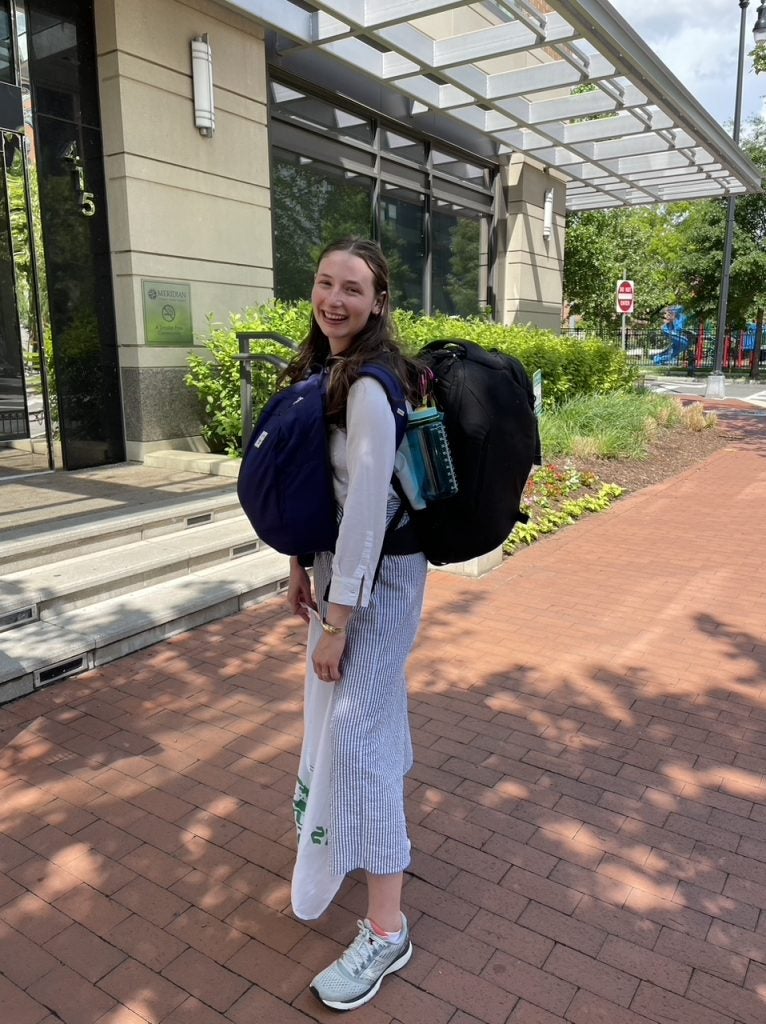
So when Hardy first discovered the opportunity to travel the world to conduct research during her junior year, it was a natural fit.
Hardy’s globe-trotting adventure was made possible by the School of Foreign Service (SFS)’s Circumnavigator Grant, a grant that gives one SFS junior the chance to conduct an around-the-world research project on an international issue.
After seeing a call for applications in the weekly SFS announcement emails, Hardy knew she had to apply.
“Although I could not have imagined myself taking a trip around the world before coming to Georgetown, I always hungered to see different places, immerse myself in different cultures and gain a truly international educational experience,” Hardy said. “I think it was this urge that compelled me to apply for the grant.”
Getting the call that she won the grant while eating at the Georgetown neighborhood restaurant Mai Thai, she knew that she was in for a once-in-a-lifetime adventure. Kicking off in DC in the summer of 2022, Hardy traveled from Morocco to France, Switzerland, Belgium, the Netherlands, Germany, Austria, Singapore, Thailand and finally to her home in Canada.
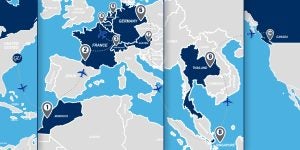
In the lead-up to her departure, Hardy had a lot to learn and prepare for. With $9,500 in her grant to travel for three months, she knew she’d have to stick to hostels and travel light.
“I was outrageously underprepared. No one should have let me go,” Hardy joked.
For the entire journey, Hardy had to live out of her backpacking gear. Her only possessions: Five outfits, two pairs of shoes, her laptop, a journal and some other basic necessities.
“I had to buy a new pair of sneakers because I quite literally walked holes into my sneakers,” Hardy said. “It was wild, truly.”
Conducting Global Research
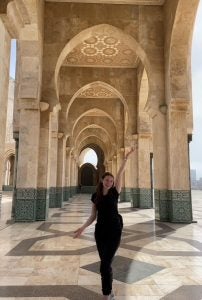
Hardy’s research project examined the variables affecting why certain countries have not signed the UN International Convention on the Protection of the Rights of All Migrant Workers and Members of their Families, a multilateral treaty signed in 1990 that today only has 58 signatories.
Hardy first got interested in this topic when she learned that the agreement was the least ratified UN human rights convention. To better understand the phenomena, Hardy examined factors such as the migration patterns and ruling political ideologies in non-signatory states.
In designing her research project, Hardy traveled to non-signatory states and Morocco, the only country on her itinerary that signed the multilateral agreement.
Staying in hostels and moving from place to place on a weekly basis, Hardy often found herself in local cafes to conduct her everyday research while also taking the time to identify subjects for in-person interviews and sites to visit to enrich her research.

Hardy’s research took her from memorials in Germany to cultural sites in Thailand. In Geneva, she observed a session of the Human Rights Council run by Michelle Bachelet — then-United Nations high commissioner for human rights — who was leading investigations into possible human rights abuses around the world.
Hardy noted how visiting these different sites enhanced her research by giving her a richer understanding of cultures.
“You can technically talk to anyone over Zoom now, but the real reason why travel is necessary for the grant is because you’re present in different spaces,” Hardy said. “It was really cool to just have so many different experiences and to realize how different corners of the world are. I think we can get really wrapped up in the belief that there’s only one way to do things. But there’s not. Every cultural context has different ways of doing things.”
Her research project also allowed her to connect with local leaders on the ground in every country to interview, including various diplomats-in-training and Bob Rae, the Canadian ambassador to the United Nations.
The Challenges and Lessons From Solo Travel
Backpacking around the world did not come without its challenges, particularly in being alone for three months.
Hardy encountered her most challenging experience while trekking alone in the wilderness in Thailand, where she was cut off from the outside world without a functioning cell phone.
“I was at this gorgeous waterfall in the middle of Thailand, and I quite literally, out of random chance, got hit by a falling tree,” Hardy recalled with humor.



